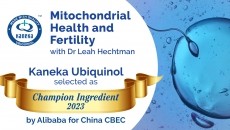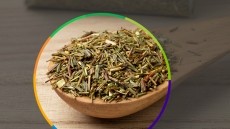Grapes may match lutein/zeaxanthin for retinal protection: Mouse data

Lab animals fed the equivalent of 3.5 servings of grapes per day protected retinas from functional decline to a similar extent as lutein (1.65 mg per mouse per day) and zeaxanthin, the leading ingredients in the eye health sector, according to findings published in Free Radical Biology and Medicine.
“We did not test if a diet combining lutein/zeaxanthin and grape additives may be more effective in preventing oxidative damage and vision loss, which is an intriguing possibility especially because the antioxidants prevalent in the two dietary additives are chemically different,” wrote the researchers, led by Silvia Finnemann, PhD, from Fordham University in New York.
“Mice differ from humans not just in body size but in many aspects of physiology as well as in lifestyle and compliance. Yet, we conclude from our study that a lifelong diet enriched in natural antioxidants is directly beneficial for retinal pigment epithelium and retinal health and function.”
The study was supported by the US National Eye Institute (National Institutes of Health) and the California Table Grape Commission. The lutein/zeaxanthin mix used in the study was supplied by Kemin Health (FloraGlo).
Macular degeneration
The macula is a yellow spot of about five millimeters diameter on the retina. As we age, levels of the pigments in the macula decrease naturally, thereby increasing the risk of age-related macular degeneration (AMD). The yellow color is due to the content of the carotenoids lutein and zeaxanthin, which we derive from the diet.
These compounds are the only carotenoids capable of filtering the harmful blue light than can damage cells in the eye, the rods and the cones.
A thin macular pigment can allow the blue light through and destroy the cells. Maintaining high levels of both carotenoids, and therefore the macular pigment, is a valid approach to maintaining eye health and reducing the risk of AMD.
In 1994, Dr Johanna Seddon and her co-workers at Harvard University reported a link between the intake of carotenoid-rich food, particularly dark green leafy vegetables like spinach, and a significant reduction in AMD (JAMA, Vol. 272, pp. 1413-1420).
Since then scores of studies have come out supporting the benefits, and elucidating the mechanisms involved.
New data
For the new study used mice prone to developing retinal damage in old age in much the same way as humans do. The animals were divided into three groups: One group received the control diet, while the second group’s diet was enriched with grapes, and the third group’s diet was enriched with lutein/zeaxanthin from marigolds.
Results suggested that both lutein/zeaxanthin and grapes protected the retina from oxidative damage and reduced the likeliness of blindness, with grapes offering slightly better protection, said the researchers.
“The protective effect of the grapes in this study was remarkable, offering a benefit for vision at old age even if grapes were consumed only at young age," said Finnemann.
Good news
The results were welcomed by Kathleen Nave, president of the California Table Grape Commission: “Preserving eye health is a key concern as we age and this study shows that grapes may play a critical role in achieving this.
“This is good news for consumers of all ages who enjoy grapes, and adds to the growing body of evidence that grapes offer an array of health benefits.”
Source: Free Radical Biology and Medicine
Published online ahead of print, doi: 10.1016/j.freeradbiomed.2011.11.021
“Dietary antioxidants prevent age-related retinal pigment epithelium actin damage and blindness in mice lacking αvβ5 integrin”
Authors: C-C. Yu, E.F. Nandrot, Y. Dun, S.C. Finnemann













